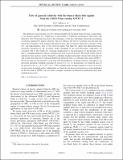Tests of general relativity with the binary black hole signals from the LIGO-Virgo catalog GWTC-1
Author(s)
LIGO Scientific Collaboration; Virgo Collaboration
DownloadPublished version (2.596Mb)
Publisher Policy
Publisher Policy
Article is made available in accordance with the publisher's policy and may be subject to US copyright law. Please refer to the publisher's site for terms of use.
Terms of use
Metadata
Show full item recordAbstract
© 2019 American Physical Society. The detection of gravitational waves by Advanced LIGO and Advanced Virgo provides an opportunity to test general relativity in a regime that is inaccessible to traditional astronomical observations and laboratory tests. We present four tests of the consistency of the data with binary black hole gravitational waveforms predicted by general relativity. One test subtracts the best-fit waveform from the data and checks the consistency of the residual with detector noise. The second test checks the consistency of the low- and high-frequency parts of the observed signals. The third test checks that phenomenological deviations introduced in the waveform model (including in the post-Newtonian coefficients) are consistent with 0. The fourth test constrains modifications to the propagation of gravitational waves due to a modified dispersion relation, including that from a massive graviton. We present results both for individual events and also results obtained by combining together particularly strong events from the first and second observing runs of Advanced LIGO and Advanced Virgo, as collected in the catalog GWTC-1. We do not find any inconsistency of the data with the predictions of general relativity and improve our previously presented combined constraints by factors of 1.1 to 2.5. In particular, we bound the mass of the graviton to be mg≤4.7×10-23 eV/c2 (90% credible level), an improvement of a factor of 1.6 over our previously presented results. Additionally, we check that the four gravitational-wave events published for the first time in GWTC-1 do not lead to stronger constraints on alternative polarizations than those published previously.
Date issued
2019Department
LIGO (Observatory : Massachusetts Institute of Technology); Massachusetts Institute of Technology. Department of Physics; MIT Kavli Institute for Astrophysics and Space ResearchJournal
Physical Review D
Publisher
American Physical Society (APS)